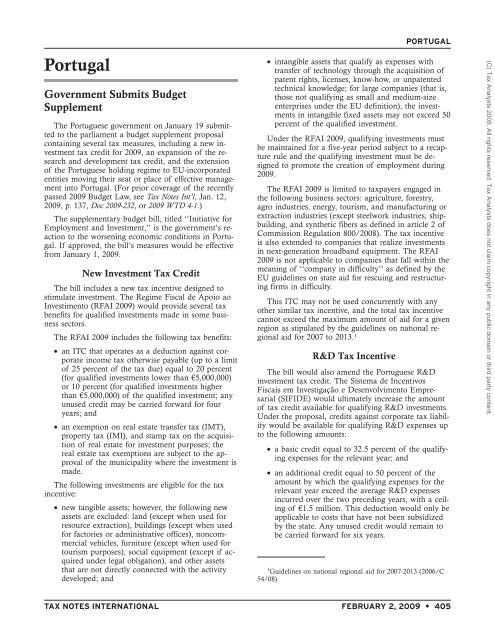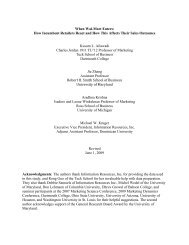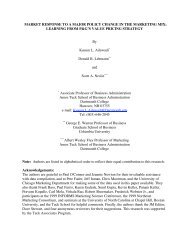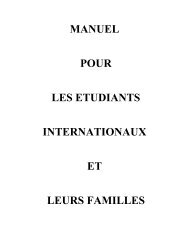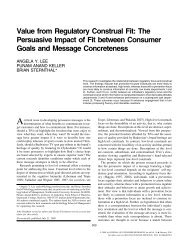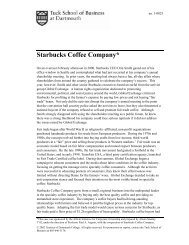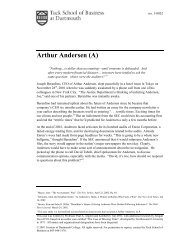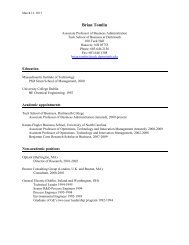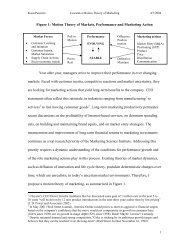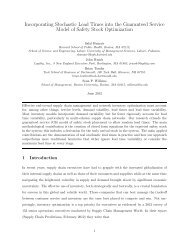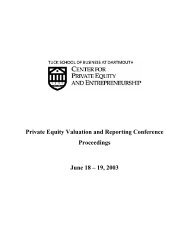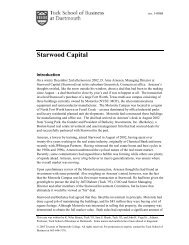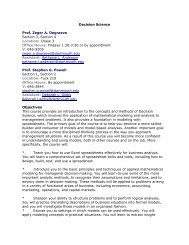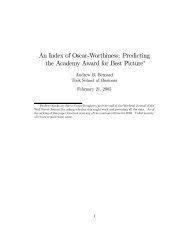tax notes international - Tuck School of Business - Dartmouth College
tax notes international - Tuck School of Business - Dartmouth College
tax notes international - Tuck School of Business - Dartmouth College
Create successful ePaper yourself
Turn your PDF publications into a flip-book with our unique Google optimized e-Paper software.
Portugal<br />
Government Submits Budget<br />
Supplement<br />
The Portuguese government on January 19 submitted<br />
to the parliament a budget supplement proposal<br />
containing several <strong>tax</strong> measures, including a new investment<br />
<strong>tax</strong> credit for 2009, an expansion <strong>of</strong> the research<br />
and development <strong>tax</strong> credit, and the extension<br />
<strong>of</strong> the Portuguese holding regime to EU-incorporated<br />
entities moving their seat or place <strong>of</strong> effective management<br />
into Portugal. (For prior coverage <strong>of</strong> the recently<br />
passed 2009 Budget Law, see Tax Notes Int’l, Jan. 12,<br />
2009, p. 137, Doc 2009-232, or2009 WTD 4-1.)<br />
The supplementary budget bill, titled ‘‘Initiative for<br />
Employment and Investment,’’ is the government’s reaction<br />
to the worsening economic conditions in Portugal.<br />
If approved, the bill’s measures would be effective<br />
from January 1, 2009.<br />
New Investment Tax Credit<br />
The bill includes a new <strong>tax</strong> incentive designed to<br />
stimulate investment. The Regime Fiscal de Apoio ao<br />
Investimento (RFAI 2009) would provide several <strong>tax</strong><br />
benefits for qualified investments made in some business<br />
sectors.<br />
The RFAI 2009 includes the following <strong>tax</strong> benefits:<br />
• an ITC that operates as a deduction against corporate<br />
income <strong>tax</strong> otherwise payable (up to a limit<br />
<strong>of</strong> 25 percent <strong>of</strong> the <strong>tax</strong> due) equal to 20 percent<br />
(for qualified investments lower than €5,000,000)<br />
or 10 percent (for qualified investments higher<br />
than €5,000,000) <strong>of</strong> the qualified investment; any<br />
unused credit may be carried forward for four<br />
years; and<br />
• an exemption on real estate transfer <strong>tax</strong> (IMT),<br />
property <strong>tax</strong> (IMI), and stamp <strong>tax</strong> on the acquisition<br />
<strong>of</strong> real estate for investment purposes; the<br />
real estate <strong>tax</strong> exemptions are subject to the approval<br />
<strong>of</strong> the municipality where the investment is<br />
made.<br />
The following investments are eligible for the <strong>tax</strong><br />
incentive:<br />
• new tangible assets; however, the following new<br />
assets are excluded: land (except when used for<br />
resource extraction), buildings (except when used<br />
for factories or administrative <strong>of</strong>fices), noncommercial<br />
vehicles, furniture (except when used for<br />
tourism purposes), social equipment (except if acquired<br />
under legal obligation), and other assets<br />
that are not directly connected with the activity<br />
developed; and<br />
• intangible assets that qualify as expenses with<br />
transfer <strong>of</strong> technology through the acquisition <strong>of</strong><br />
patent rights, licenses, know-how, or unpatented<br />
technical knowledge; for large companies (that is,<br />
those not qualifying as small and medium-size<br />
enterprises under the EU definition), the investments<br />
in intangible fixed assets may not exceed 50<br />
percent <strong>of</strong> the qualified investment.<br />
Under the RFAI 2009, qualifying investments must<br />
be maintained for a five-year period subject to a recapture<br />
rule and the qualifying investment must be designed<br />
to promote the creation <strong>of</strong> employment during<br />
2009.<br />
The RFAI 2009 is limited to <strong>tax</strong>payers engaged in<br />
the following business sectors: agriculture, forestry,<br />
agro industries, energy, tourism, and manufacturing or<br />
extraction industries (except steelwork industries, shipbuilding,<br />
and synthetic fibers as defined in article 2 <strong>of</strong><br />
Commission Regulation 800/2008). The <strong>tax</strong> incentive<br />
is also extended to companies that realize investments<br />
in next-generation broadband equipment. The RFAI<br />
2009 is not applicable to companies that fall within the<br />
meaning <strong>of</strong> ‘‘company in difficulty’’ as defined by the<br />
EU guidelines on state aid for rescuing and restructuring<br />
firms in difficulty.<br />
This ITC may not be used concurrently with any<br />
other similar <strong>tax</strong> incentive, and the total <strong>tax</strong> incentive<br />
cannot exceed the maximum amount <strong>of</strong> aid for a given<br />
region as stipulated by the guidelines on national regional<br />
aid for 2007 to 2013. 1<br />
R&D Tax Incentive<br />
PORTUGAL<br />
The bill would also amend the Portuguese R&D<br />
investment <strong>tax</strong> credit. The Sistema de Incentivos<br />
Fiscais em Investigação e Desenvolvimento Empresarial<br />
(SIFIDE) would ultimately increase the amount<br />
<strong>of</strong> <strong>tax</strong> credit available for qualifying R&D investments.<br />
Under the proposal, credits against corporate <strong>tax</strong> liability<br />
would be available for qualifying R&D expenses up<br />
to the following amounts:<br />
• a basic credit equal to 32.5 percent <strong>of</strong> the qualifying<br />
expenses for the relevant year; and<br />
• an additional credit equal to 50 percent <strong>of</strong> the<br />
amount by which the qualifying expenses for the<br />
relevant year exceed the average R&D expenses<br />
incurred over the two preceding years, with a ceiling<br />
<strong>of</strong> €1.5 million. This deduction would only be<br />
applicable to costs that have not been subsidized<br />
by the state. Any unused credit would remain to<br />
be carried forward for six years.<br />
1<br />
Guidelines on national regional aid for 2007-2013 (2006/C<br />
54/08).<br />
TAX NOTES INTERNATIONAL FEBRUARY 2, 2009 • 405<br />
(C) Tax Analysts 2009. All rights reserved. Tax Analysts does not claim copyright in any public domain or third party content.


